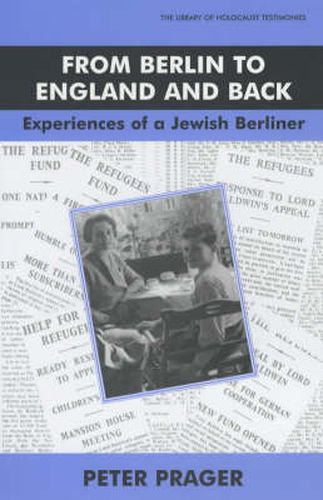Readings Newsletter
Become a Readings Member to make your shopping experience even easier.
Sign in or sign up for free!
You’re not far away from qualifying for FREE standard shipping within Australia
You’ve qualified for FREE standard shipping within Australia
The cart is loading…






In this autobiography, Peter Prager provides a vivid account of life in Berlin before, during and after the war, as experienced by German Jews. His account of life once he arrived in Britain is told with sensitivity and humour. The Prager family connection to Berlin had its roots in the early 19th century when the Prussian edict of 1812 gave Jerws equal rights; encouraged by this, the author’s great-granfather moved to Berlin in 1821 and founded a suitcase factory. A great success, this factory was to become accredited to the King of Prussia and, later, the Kaiser. Political tolerance proved fragile under the strain of war and economic instability. Within weeks of the marriage of the author’s parents in 1920 the Kapp Putsch occurred, and Germany was in the grip of economic and political downtown. At the age of ten, Peter was to witness the advent of Hitler, the rise of teh Nazi party, and the growth of open anti-semitism. The survival of Peter and his mother during the Third Reich was only due to his mother’s third marriage to Onkel Franz, a gentile; and Peter was sent to England in a kindertransport.
$9.00 standard shipping within Australia
FREE standard shipping within Australia for orders over $100.00
Express & International shipping calculated at checkout
In this autobiography, Peter Prager provides a vivid account of life in Berlin before, during and after the war, as experienced by German Jews. His account of life once he arrived in Britain is told with sensitivity and humour. The Prager family connection to Berlin had its roots in the early 19th century when the Prussian edict of 1812 gave Jerws equal rights; encouraged by this, the author’s great-granfather moved to Berlin in 1821 and founded a suitcase factory. A great success, this factory was to become accredited to the King of Prussia and, later, the Kaiser. Political tolerance proved fragile under the strain of war and economic instability. Within weeks of the marriage of the author’s parents in 1920 the Kapp Putsch occurred, and Germany was in the grip of economic and political downtown. At the age of ten, Peter was to witness the advent of Hitler, the rise of teh Nazi party, and the growth of open anti-semitism. The survival of Peter and his mother during the Third Reich was only due to his mother’s third marriage to Onkel Franz, a gentile; and Peter was sent to England in a kindertransport.